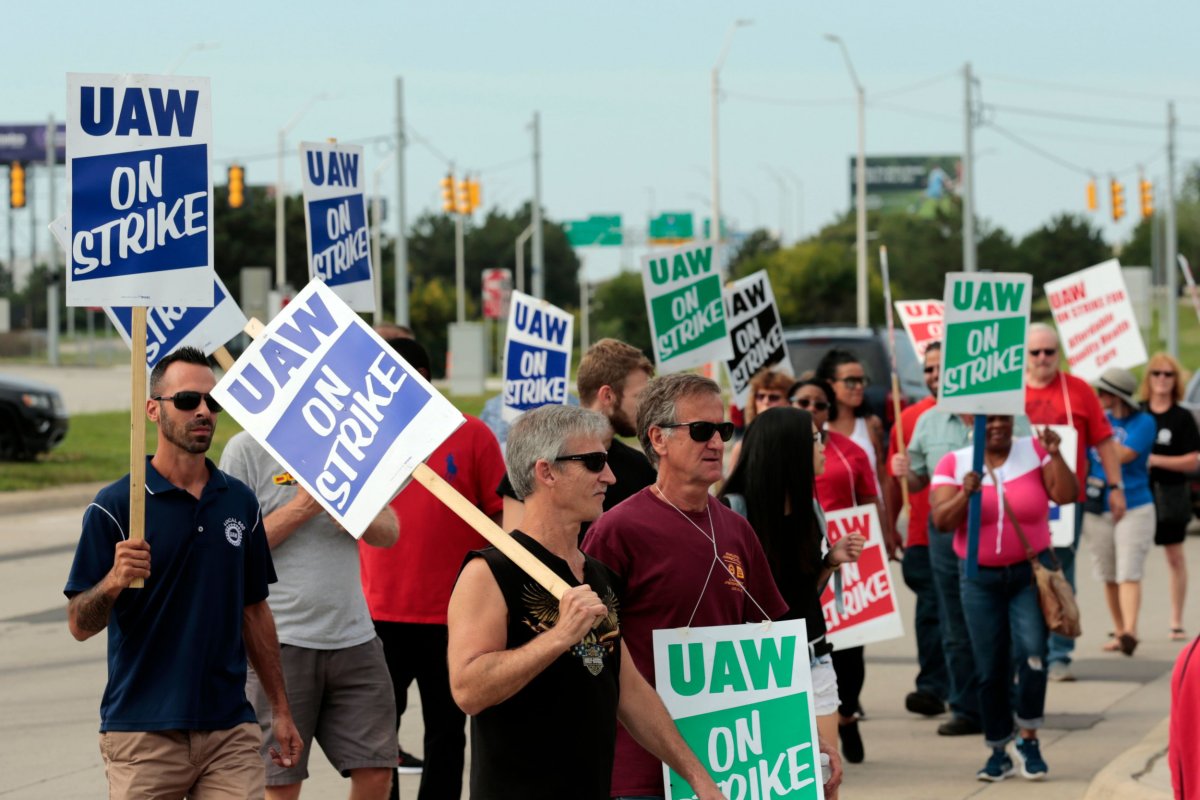As the General Motors strike enters its second week, nearly 50,000 workers continue to demand what they see as their fair share of its profits and an end to layoffs. What's happened to GM's workers is a microcosm of what's happened to the American worker.
In 2009, when GM was on the brink of collapse, the United Automobile Workers labor union agreed to let the company hire people at about half the prevailing hourly wage and with skimpier retirement benefits, bring on temp workers at even lower rates and outsource more jobs abroad. American taxpayers also forked over more than $10 billion to save the company.
When GM went public again in 2010, it boasted to Wall Street that 43 percent of its cars were made outside the United States in places where labor cost less than $15 an hour, while in America it could now pay "lower-tiered" wages and benefits for new employees.
The corporation came roaring back. Over the past three years, it's made $35 billion in North America.
But its workers are still getting measly pay packages, and GM is still outsourcing like mad.
Last year, it assigned its new Chevrolet Blazer, a sport utility vehicle that had been made in the United States, to a Mexican plant, while announcing it would lay off 18,000 American workers.
Earlier this year, it shut its giant plant in Lordstown, Ohio, which President Donald Trump had vowed to save. "Don't move. Don't sell your house," he said in 2017 at a rally about 15 miles away in Youngstown.
GM is still getting corporate welfare—since Trump took office, some $600 million in federal contracts and $700 million in tax breaks (including the president's giant corporate tax cut).
Some of this largesse has gone into the pockets of GM executives. Chairman and CEO Mary Barra raked in a compensation package worth almost $22 million last year.
Last month, the Business Roundtable—a confab of American CEOs on whose executive committee Barra sits—pledged to compensate all employees "fairly" and provide them "important benefits."
Why should anyone believe them? For 40 years, these CEOs have fought unions, outsourced jobs abroad, loaded up on labor-replacing technologies without retraining their workers and abandoned their communities when they could do things more cheaply elsewhere.
Amazon CEO Jeff Bezos signed the same statement. Last week, Amazon-owned Whole Foods announced it would be cutting medical benefits for its entire part-time workforce—at a total savings of about what Bezos probably makes in two hours.
Corporate profits have reached record levels, but nothing has trickled down to most workers.
Profits now constitute a larger portion of national income, and wages a lower portion, than at any time since World War II. These profits are generating higher share prices (fueled by share buybacks) and higher executive pay, resulting in wider inequality. The richest 1 percent of Americans own about 40 percent of all stock value; the richest 10 percent, around 80 percent.
The demise of unions explains much of this. In the mid-1950s, over a third of all workers in the private sector were unionized. This gave them substantial bargaining power to get higher wages and benefits.

Today, just 6.4 percent of private-sector workers are unionized, eliminating most of that bargaining power. Researchers have found that between 1952 and 1988, almost all of the rise in share values came as a result of economic growth, but from 1989 to 2017, economic growth accounted for just 24 percent of the rise. Most of the increase has come from money that otherwise would have gone to workers.
America's shift from farm to factory was accompanied by decades of bloody labor conflict. The subsequent shift from factory to office and other service jobs created further social upheaval.
The more recent power shift from workers to shareholders—and consequentially, the dramatic widening of inequality—has happened far more quietly, but it has had a more unfortunate and lasting consequence for the system: stagnant wages, abandoned communities and an angry working class vulnerable to demagogues peddling authoritarianism, racism and xenophobia.
Donald Trump didn't come from nowhere, but he's a fake champion of the working class. If he were the real thing, he'd be walking the picket line with GM workers.
Robert B. Reich is an American political commentator, professor, and author. He served in the administrations of Presidents Gerald Ford, Jimmy Carter and Bill Clinton.
The views expressed in this article are the author's own.
Uncommon Knowledge
Newsweek is committed to challenging conventional wisdom and finding connections in the search for common ground.
Newsweek is committed to challenging conventional wisdom and finding connections in the search for common ground.
About the writer
To read how Newsweek uses AI as a newsroom tool, Click here.








